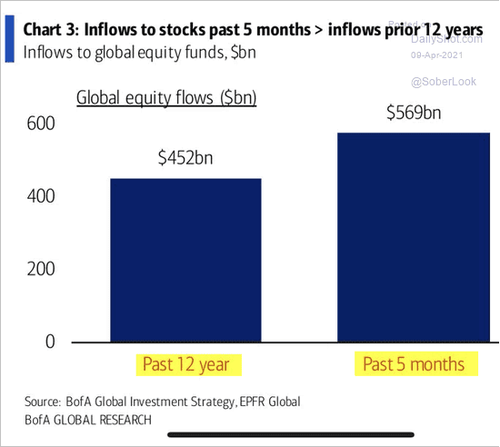
Dirk de Herder Amstel Bridge, Amsterdam 1946

Another one of those days where there’s just too much news. So I split it up in this Debt Rattle and this Covid Rattle published before.
Note: I could have called this a Russia Rattle, the US provocations vs Moscow reign supreme. In that vein, it is remarkable (if anything still is at all) that at the exact same moment the “Russian bounties on American soldiers’ lives” narrative is fully debunked, it still serves as the main driver behind the new sanctions on Russia. Facts are just inconvenient details by now, it’s the story that counts.

Biden court packing
Biden: FDR’s Court-packing plan “put in question, for an entire decade, the independence of the most significant body in this country.” pic.twitter.com/2azfOx3ll7
— Andy Grewal (@AndyGrewal) April 15, 2021

OPCW
I asked #OPCW Director Gen. Fernando Arias many questions re 'Staged Chemical Attack in Douma' which #US #France #UK used as an excuse to illegally bomb #Syria – He refused to answer. OPCW Chief has been exposed as a pawn for Western Imperialism – He is destroying the OPCW…. pic.twitter.com/50Tzvoji7l
— Mick Wallace (@wallacemick) April 15, 2021

“Putin So Upset Over Biden’s Killer Comments He Moved 28,222 Russian Troops To Ukraine Border..”
The only thing the Russia sanctions have accomplished is they made Russia stronger, self-sufficient.
• Biden Declares Russia Threat ‘National Emergency’ (Fox)
President Biden on Thursday signed an executive order declaring a “national emergency” over the threat from Russia, as his administration slapped new sanctions on the country. The U.S. Department of State said it is expelling 10 officials from Russia’s bilateral mission. “Today, we announced actions to hold the Russian Government to account for the SolarWinds intrusion, reports of bounties on U.S. soldiers in Afghanistan, and attempts to interfere in the 2020 U.S. elections,” Secretary of State Antony Blinken said in a statement. The White House also released a letter to Congress stating that the president has issued “an Executive Order declaring a national emergency with respect to the unusual and extraordinary threat to the national security, foreign policy, and economy of the United States posed by specified harmful foreign activities of the Government of the Russian Federation.”
The letter said that Russia had aimed to “undermine the conduct of free and fair democratic elections,” engaged in “malicious cyber-enabled activities,” targeted journalists and dissenters outside of its borders, and violated international law. This, Biden said in the letter, constitutes “an unusual and extraordinary threat to the national security, foreign policy, and economy of the United States.” Blinken’s statement went into more detail, citing not only the SolarWinds hack that compromised many agencies in the federal government but also the poisoning of top Putin political rival Alexei Navalny. “We remain concerned about Navalny’s health and treatment in prison, and call for his unconditional release,” Blinken said.
Navalny is currently in the custody of the Russian government and reported not to be well. White House Press Secretary Jen Psaki previously said that “[t]he Russian government is responsible for his health and well-being.” Blinken also emphasized Thursday, however, “the United States will also seek opportunities for cooperation with Russia, with the goal of building a more stable and predictable relationship consistent with U.S. interests.” Kremlin Spokesman Dmitry Peskov, according to the Russian state-run media organization TASS, said “[w]e condemn any pursuit of sanctions, we consider them illegal. In any case, the principle of reciprocity in this matter is valid; reciprocity in a way that best serves our interests.”

Putin called for the summit first, just not one in person. That Biden did it, is also just a narrative. He calls Putin a killer and declares more sanctions, and only then says: let’s talk. Not going to happen now.
• Kremlin Pledges To Respond In Kind To Any ‘Illegal’ New US Sanctions (R.)
The Kremlin said on Thursday it would respond in kind to any new “illegal” new U.S. sanctions on Russia and warned any new measures would reduce the chances of a summit between U.S. President Joe Biden and President Vladimir Putin taking place. People familiar with the matter told Reuters on Wednesday that the United States may announce sanctions on Russia as soon as Thursday for alleged interference in U.S. elections and malicious cyber activity, targeting several individuals and entities. The Kremlin has denied U.S. allegations that Russia tried to meddle in the 2020 U.S. presidential election or that it was behind a cybersecurity breach affecting software made by SolarWinds Corp.
Kremlin spokesman Dmitry Peskov said Moscow would wait to see what happened on the sanctions front before commenting in detail. But he said the Kremlin’s stance on sanctions and its response to them remained unchanged. “We condemn any intentions to impose sanctions, consider them illegal, and in any case the principle of reciprocity operates in this area,” said Peskov. “Reciprocity so that our own interests are ensured in the best possible way.” Russia did not want relations with Washington to be a case of “one step forward and two steps back,” he added. Biden, in a phone call on Tuesday, proposed a summit with Putin to tackle a raft of disputes and told Moscow to reduce tensions over Ukraine triggered by a Russian military build-up.
The Kremlin has so far responded coolly to the summit idea making clear it will be contingent upon U.S. behavior towards Russia. Peskov said on Thursday that any new U.S. sanctions would not increase the chances of such a summit taking place, but said it would be up to the two presidents to decide on the matter. Putin’s participation in a Biden-backed climate summit remained under discussion, Peskov said. He said the situation around Ukraine remained tense with NATO and U.S. forces still deployed close to Russia’s own borders. It was therefore premature, he said, to talk about de-escalation, despite reports that the United States had canceled the deployment of two of its warships to the Black Sea.

“I’ve learned to hate the Russians, all through my whole life; if another war comes, it’s them we must fight. To hate them and fear them, to run and to hide…”
• The West’s Sole Prerogative Is Russia Has No Right To Self-Defense (Kovalik)
As tensions increase between Moscow and NATO over a buildup of troops near the Donbass, actually initiated by Ukraine, the West’s apparent position is that Russia has no right to self-defense. That’s been the case for decades. Having grown up in middle America during the waning years of the Cold War, I possessed a not-so-healthy fear of an imminent Soviet invasion or attack. Bob Dylan would capture this type of fear and hysteria in his 1964 song ‘With God on Our Side’, which he ripped off from the Clancy Brothers and Dominic Behan. Dylan’s updated version of ‘The Patriot Game’ declared: “I’ve learned to hate the Russians, all through my whole life; if another war comes, it’s them we must fight. To hate them and fear them, to run and to hide…”
It is quite incredible to me that, nearly 60 years later, with the USSR itself having fallen in the meantime, these words still ring true in the West today. However, the truth is, as I came to find out later in life, it is the Russians who have had much more to fear from us than we have from them. And it is this understanding and indeed empathy for Russia which motivates me now to wish my country would stop its aggressive moves towards that country before it is too late; before we find ourselves involved in another great war in Europe. From the point of view of Russia, it is they who have been under constant threat from the West, certainly from the time of the Napoleonic Wars to the present. It is France which invaded Russia in 1812, with the result being the loss of about 200,000 Russian lives.
The Russians were able to survive and emerge victorious only by burning down three quarters of Moscow to the ground, leaving the French stranded and unable to supply themselves. In 1941, Soviet Russia, abandoned by the UK and the US to its own fate, was invaded by Nazi Germany and laid siege to. Ultimately, the Soviets were able to turn Germany back in the great battle of Stalingrad, but the USSR would lose nearly 27 million lives by the end of the war. While 80 to 90 percent of the German casualties were suffered on the Eastern Front at the hands of the Soviets and Communist Partisans, Russia’s incredible sacrifice in WWII has largely been forgotten and even denied in the West, with the US and the UK now taking credit for the Allied victory.
While Ernest Hemingway remarked – quite rightly – that “Every human being who loves freedom owes to the Red Army more than he will be able to pay in a lifetime,” these words, and the sentiment behind them, have been forgotten in a haze of collective amnesia. Incredibly, Russian President Vladimir Putin was not even invited to the commemoration of the liberation of Auschwitz on Holocaust Memorial Day – this despite the fact that it was the a Russian regiment from Gorky (now Nizhny Novgorod) which liberated the captives of the death camp.

It served its purpose. And the MSM was all too happy to go along.
• US Intel Walks Back Claim Russians Put Bounties on American Troops (DB)
It was a blockbuster story about Russia’s return to the imperial “Great Game” in Afghanistan. The Kremlin had spread money around the longtime central Asian battlefield for militants to kill remaining U.S. forces. It sparked a massive outcry from Democrats and their #resistance amplifiers about the treasonous Russian puppet in the White House whose admiration for Vladimir Putin had endangered American troops. But on Thursday, the Biden administration announced that U.S. intelligence only had “low to moderate” confidence in the story after all. Translated from the jargon of spyworld, that means the intelligence agencies have found the story is, at best, unproven—and possibly untrue.
“The United States intelligence community assesses with low to moderate confidence that Russian intelligence officers sought to encourage Taliban attacks on U.S. and coalition personnel in Afghanistan in 2019 and perhaps earlier,” a senior administration official said. “This information puts a burden on the Russian government to explain its actions and take steps to address this disturbing pattern of behavior,” the official said, indicating that Biden is unprepared to walk the story back fully. Significantly, the Biden team announced a raft of sanctions on Thursday. But those sanctions, targeting Russia’s sovereign debt market, are prompted only by Russia’s interference in the 2020 election and its alleged role in the SolarWinds cyber espionage. (In contrast, Biden administration officials said that their assessment attributing the breach of technology company SolarWinds to hackers from Russia’s Foreign Intelligence Service was “high confidence.”)
“We have noted our conclusion of the review that we conducted on the bounties issue and we have conveyed through diplomatic, intelligence, and military channels strong, direct messages on this issue, but we are not specifically tying the actions we are taking today to that matter,” a senior administration official told reporters in reference to the bounty claims. According to the officials on Thursday’s call, the reporting about the alleged “bounties” came from “detainee reporting”–raising the specter that someone told their U.S.-aligned Afghan jailers what they thought was necessary to get out of a cage. Specifically, the official cited “information and evidence of connections to criminal agents in Afghanistan and elements of the Russian government” as sources for the intelligence community’s assessment.
Russian bounties Trump
Four years of propaganda from the CIA/Media/Democratic-Party axis condensed into 1 minute and 20 seconds from NBC News. This is what was done over and over: pic.twitter.com/FcNtf34F1K
— Glenn Greenwald (@ggreenwald) April 15, 2021

Taibbi’s list from last month has been updated with “Bountygate”.
• Update: Master List Of Official Russia Claims That Proved To Be Bogus (Taibbi)
Updated 4/15/21 “Bountygate.” In July of 2020, according to “officials briefed on the matter,” the New York Times reported, and the Washington Post “confirmed,” that “a Russian military spy unit offered bounties to Taliban-linked militants to attack coalition forces in Afghanistan.” It’s impossible to overstate how head over heels the politicians and press alike went with this story. It became instantly election-year fodder, with Kamala Harris saying of Trump, “He let Putin get away with placing bounties on the heads of our troops.” Illinois Senator Tammy Duckworth instantly called for hearings into the matter, making the inevitable Russiagate tie-in. “First, Donald Trump encouraged Russia to interfere in our democracy, and they did,” she said. “Now, Russia is secretly paying militants to kill U.S. troops. Trump has known for months but apparently done nothing to stop them.”
The story had a dual impact politically, dealing a blow to Trump throughout the summer of a general election, while also seeming to present a reason not to withdraw from Afghanistan two weeks before Congress voted on the re-authorization of the Authorization to Use Military Force (AUMF) justifying the U.S. troop presence in Afghanistan. In hindsight, it’s incredible to see how easy it is for military or intelligence officials to impact budgetary or policy matters: just leak a hot story before a key vote. The Daily Beast was one of many news outlets to go full click-farm, with banner headlines like, “Russian ‘Bounties’ Mess is all of Trump’s Scandals Rolled into One” and “Russian Bounties Led to U.S. Troops’ Deaths, Intelligence Officials Believe,” with graphics announcing “BOMBSHELL,” “HOSTILE POWER” and “SHOCK VALUE!”
The Washington Post’s official “fact checker” column gave Trump its dreaded “four Pinocchios” rating for saying, “that’s an issue that many people said was fake news.” In fact, many people did say it was fake news, including Colin Powell, who went on MSNBC to describe the coverage of the story as “hysterical,” adding, “What I know is that our military commanders on the ground did not think that it was as serious a problem as the newspapers were reporting and television was reporting.” Two months after the story came out, an on-the-record military official was less certain:
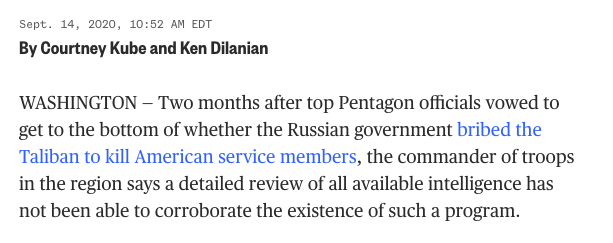
Roughly seven months after that, on April 15, 2021, a senior administration official told reporters on a conference call that the U.S. now assessed with “low to moderate confidence that Russian intelligence officers sought to encourage Taliban attacks against U.S. coalition personnel in Afghanistan in 2019.” The Beast, one of the chief propagators of the original fairy tale, ran a new story over the graphic, TURNAROUND. “U.S. Intel Walks Back Claim Russians Put Bounties on American Troops,” the headline read, adding, without irony, that “there were reasons to doubt the story at the time.” [..] Does this mean the Russians don’t meddle? Of course not. But we have to learn to separate real stories about foreign intelligence operations with posturing used to target domestic actors while suppressing criticism of domestic politicians. It’s only happened about a hundred times in the last five years — maybe it’s time to start asking for proof in these episodes?
Russian bounties
SUPERCUT:
A look back on how cable news went all in on the discredited Russian bounties story. pic.twitter.com/QaG9xAqiuR
— Daily Caller (@DailyCaller) April 15, 2021

We are so surprised.
• SecDef Austin Hints at Continued US Military Involvement in Afghanistan (AW)
Secretary of Defense Lloyd Austin on Wednesday said the US would continue to support the Afghan government’s military after President Biden withdraws troops from the country and hinted at a possible “counterterrorism” force in the region that could strike targets in Afghanistan. “We will look to continue funding key capabilities such as the Afghan Air Force and Special Mission Wing, and we will seek to continue paying salaries for Afghan Security Forces,” Austin said at a NATO press conference in Brussels. “We will also work closely with them and with our allies to maintain counterterrorism capabilities in the region,” he added. “I think you’ll understand why I won’t get into specific details about where our counterterrorist assets may be positioned,” Austin said when asked where counterterrorism troops could be deployed in the region.
“In terms of our ability to acquire targets and engage them in places where we are not … We have the reach and the ability to in fact do that,” he said, suggesting the US wants to maintain the capability to bomb Afghanistan. The New York Times reported on Thursday on how the US is planning to continue fighting in Afghanistan “from afar.” The report reads: “The Pentagon, American spy agencies and Western allies are refining plans to deploy a less visible but still potent force in the region to prevent the country from again becoming a terrorist base.” Unnamed US officials speaking to the Times floated neighboring Tajikistan, Kazakhstan and Uzbekistan, as possible locations to reposition forces from Afghanistan.

Great Twitter thread from Pettis. The entire narrative about the e-yuan being a huge threat to the USD makes very little sense. Nobody wants the e-yuan for the same reason they don’t want the yuan. China has total control.
• The Role of Reserve Currencies (Michael Pettis)
Apologies in advance for this very long thread, but as regular readers know, I worry greatly about common misunderstandings of the role of reserve currencies. The author seems to assume that what makes a currency a dominant reserve currency is its low frictional trading costs, which is why, he believes, digital currencies, with China in the lead, will dominate international trade. But while a low frictional trading cost is a necessary condition, it is not nearly sufficient. A quick glance at the role of the US dollar over the past 100 years, the period during which it achieved dominant status, makes this clear: when the world was short of savings relative to its investment needs, during the first fifty years of that period (a period characterized by the global need to rebuild economically from 2 world wars) the US was a permanent net provider of savings to the world.
In the next five decades, however, when the global economy was substantially rebuilt and needed to export excess savings, the US automatically became a permanent net absorber of foreign savings. Of course during this time the US shifted from permanent trade surpluses, when the world needed the US to supply it with food, capital goods and consumer goods, to permanent trade deficits, when the world urgently some place in which to dump excess production of consumer goods. This was no mere coincidence. To me it suggests three things. First, that reserve currency status is a function of a lot more than low-cost trading. In fact given that the cost is already so low, and seems to be in permanent decline anyway, I suspect it doesn’t even matter much any more.
What seems to matter a lot more is the willingness of the reserve-currency country to run large imbalances in response not to its own needs but rather to the needs of the rest of the world. As an excellent CFR resource shows, the US typically absorbs 40-50% of global imbalances, and the Anglophone economies — with similar financial markets all of whom, like the US, punch way above their weights as international reserve currencies — collectively absorb 65-75% of global imbalances. Given that China’s currency (and that of other surplus countries, like Japan) punches so far below it’s weight, it is surprising that anyone would argue that there is no relationship between the international status of a currency and its willingness and ability to absorb global imbalances.
Second, the reason these countries are “willing” to accept major reserve-currency status has more to do with ideology than with economic rationality, driven by, and reinforcing, the disproportionate power of the financial sector on domestic decision-making. Like the UK in the 1920s, they are perhaps too willing to sacrifice the needs of the producer side of their economies in order to maintain the overwhelming power of the financial side. The result, as Matthew Klein and I show in our book, is that these reserve-currency countries have constantly to choose between allowing unemployment to rise or allowing debt to rise. They have mostly chosen the latter.
And third, while China has been promising for nearly two decades that its currency will achieve dominant reserve status within five years or so, in fact the RMB is probably the least important of the top ten currencies given China’s status as the second largest economy and largest trader in the world, and by relevant standards its role has barely improved in the past decade and may even have declined. Why? Because for all over-excited talk about achieving major international status, Beijing has always refused to take the economic steps needed to increase its role in absorbing global imbalances. On the contrary, when Covid-19 created a demand shock in a world already suffering from excess savings and insufficient demand, Beijing had an incredible opportunity to boost the role of the RMB by boosting net domestic demand. Instead it implemented a muscular supply-side response that actually worsened its contribution to global demand imbalances.
In the end I do expect the international status of the US dollar eventually to decline, but not because of the rise of the yen (which, we were told in the 1980s and 1990s, was virtually assured) or of the RMB. Either it will decline because the US decides that it is no longer willing to absorb the huge and rising economic cost of dominant reserve-currency status to its producing sectors and its balance sheet in exchange for the declining geopolitical benefits and to maintain the status and dominance of of its financial sector (which may be the same thing), or it will decline when the cost of maintaining the power of the dollar helps sufficiently undermine the US economy, which has always been the real source of American power. The experience of the UK in the 1920s provides an accelerated vision of how that can happen.

The middle class got suckered in the moment banks and central banks, Fannie and Freddie, started pumping up housing prices and manipulating mortgage rates. And yeah, now they’re suckered into stocks, because rates are negative, and savings worse than worthless.
• The Middle Class Has Finally Been Suckered into the Casino (CHS)
For 12 long years, savers have been eviscerated while gamblers have been ceaselessly backstopped and bailed out by the Fed. In the Fed’s rigged casino, it’s not only rational to make high-risk bets, it’s rational to borrow as much money as you can to increase your stake and leverage your bets–because the Fed has our backs and so every wager on markets lofting higher will pay off. It’s crazy not to max out credit and leverage because the Fed has guaranteed every punter will be a winner. I explained the feedback loop this creates–the more the Fed guarantees markets will never be allowed to decline, the greater the incentives to borrow and leverage ever riskier bets in the Fed’s casino[..]
The middle class has finally surrendered the last of its rational risk-aversion and gone all-in on bets in the Fed’s rigged casino. Big players don’t use margin accounts in brokerages; they have immense lines of credit and tools to leverage their bets. It’s the so-called retail traders who use margin, and so the unprecedented highs in margin debt are evidence that the middle class has gone all-in on bets markets will only loft higher forever. Record inflows into equities adds more evidence that the middle class has been suckered into the Fed’s rigged casino. Why lose money every day in savings and money market accounts when newbie punters are raking in $250,000 a month playing options on Gamestop?
Alas, the majority of this “wealth” is phantom, as revealed by the chart of tangible (real) / intangible (financial) assets. The Fed’s casino prints trillions of dollars and gives them to the biggest gamblers for free, and so the artificial semblance of free money for everyone who gambles is compelling. Unfortunately, the Fed’s casino is only rigged to benefit the Fed’s cronies. Everyone else is suckered in to lose whatever they have. The Fed’s cronies have been impatiently waiting for the suckers to surrender their rational risk aversion and flood into the rigged casino to share in the Fed’s limitless wealth machine: the more you risk, the more you win!


This could have been in today’s Covid Rattle, I know.
• Arts Venue Closures Likely After Long Delay in Federal Grant Program (Dayen)
A critical $16.25 billion grant program to sustain thousands of small creative venues that haven’t been able to open since the pandemic began has yet to deliver a cent of relief four months after passage, due to delays and faulty technology at the Small Business Administration (SBA). A website constructed to take grant applications closed last week after only four hours online, because of constant crashes and an inability to intake documents. It has not been restored and there’s no timetable for its return. The program, based on the landmark Save Our Stages legislation put into last December’s COVID relief bill, was the largest investment in the arts in U.S. history. But the byzantine application process (often requiring over 100 pages of documents) and stubborn lack of payout has music clubs, small museums and movie theaters, and other venues either closing or looking to sell out to larger firms.
“Understandably, landlords can’t last forever,” said Audrey Fix Schaefer, communications director with the National Independent Venues Association, a lead driver of Save Our Stages. “Eviction notices are coming. People are like, ‘we can’t do this anymore.’” The situation reinforces the importance of policy implementation, the primary responsibility of the executive branch. SBA has been notorious for decades for failing in its mission to support small businesses, and the changeover in administrations to President Biden has not ameliorated this. A critical Inspector General report released a week ago noted that the grants management office where the program is being run from has only one designated official managing the process; the rest of the staff is on “temporary detail.”
SBA Spokesperson Andrea Roebker, said that the program, known as Shuttered Venues Operating Grants (SVOG), has been “built from the ground up,” and that the agency “is committed to delivering this much-needed relief to these venues, many of which have been closed for extended periods of time.” But in the meantime, venue operators must wait agonizingly, living on borrowed time, borrowed money, and the fear of collapse.

So far, all the e-currencies look like feeble attemps at suppressing bitcoin. The problem: central banks want full control.
• E-Euro Starts To Take Shape (Dolan)
The promised digital euro started to take shape this week and signals from Frankfurt may offer some relief to nervy commercial banks worried about being sidelined by the latest disrupter. With the “hands off” pandemic accelerating the demise of physical cash, and private-sector crypto and stablecoins threatening to invade the space, the pledge last year of a digital euro within five years came before the European Central Bank knew what exactly it would be or how it would function. As nearly every central bank working on digital legal tender suggesting a different model or system, the debate over design has ranged widely over the past 6 months – from digital tokens to a direct central bank accounts or something in between.
But responses from the ECB’s public consultation, released this week, have gone some way to narrowing the options discussed – with the feedback showing a preference for privacy, though not anonymity, and a role for the existing banking system. Although this was just one survey, and the ECB laced it with caveats about how unrepresentative the sample was of euro zone citizens, it may give some clues to the direction of travel. Respondents’ heavy stress on privacy and security appears to be coupled with a preference for the digital euro to exist offline, like a token held in smartphones or digital wallets. What’s more, they seem to want it to exist alongside rather than instead of physical cash and to operate in conjunction with the existing banking system.
That addresses one of the biggest financial stability concerns plaguing plans for digital currencies, already being trialled by the People’s Bank of China and which the U.S. Federal Reserve has called a “high priority project”. Many fear that if a digital currency is effectively a open-ended deposit account directly with the central bank, then its inherent guarantee will see deposits flee commercial banks, especially in a crisis, and undermine the retail banking system. To counter that, ECB board member Fabio Panetta has proposed limiting deposits to households only, and to a maximum of 3,000 euros – effectively penalising holdings in excess of that, and accounts held by companies or investors, with deeply negative interest rates.

“Section 230 may have protected them before, but it will not protect them from me. The complaint will be filed Monday.”
How much different would Project Veritas’ situation be if it were sympathetic to the Dems?
• Twitter Suspends Project Veritas’ James O’keefe After Undercover Scoops (RT)
Twitter has banned Project Veritas founder James O’Keefe for alleged violation of its policies on “platform manipulation and spam,” silencing his account amid a series of undercover scoops on CNN’s propagandist tactics. The social media giant told O’Keefe on Thursday that his account is permanently suspended and will not be reinstated, citing an allegation that he used fake or multiple accounts to manipulate conversations on the platform. Twitter said in a statement to The Hill and other media outlets that “you can’t artificially amplify or disrupt conversations through the use of multiple accounts.” The shutdown came after O’Keefe posted three straight days of scoops in which CNN technical director Charlie Chester is shown on video, talking to an undercover reporter.
Chester, who reportedly thought he was talking to a Tinder date, told the reporter about CNN’s propagandist efforts to oust President Donald Trump, its fearmongering about Covid-19 to boost ratings and its efforts to make Black Lives Matter look good. O’Keefe’s suspension from Twitter will likely come as good news to CNN, which hasn’t responded to the latest round of Project Veritas stories about the network and has lobbied for competing news outlets to be censored for reporting “misinformation.” O’Keefe issued a statement on Thursday, vowing to sue Twitter for defamation and denying that he operated fake accounts. “This is false, this is defamatory, and they will pay,” he said. “Section 230 may have protected them before, but it will not protect them from me. The complaint will be filed Monday.” He invited supporters to follow him on Telegram.
Veritas
https://twitter.com/i/status/1382848287506583552

“Guo Shuqing, China’s top banking regulator, said in March that the country was exposed to “bubbles” in international markets and its own real estate sector.”
• China’s Economy Grows By A Record 18.3% In Q1; It’s Not Enough (ZH)
China’s economy grew by a record 18.3% in the first three months of 2021, its fastest annual growth rate in history reflecting the weak comparison to the lockdown period in early 2020. However, in keeping with the recent theme of China’s slowing credit impulse, the GDP print wasn’t nearly enough and disappointed markets which were expecting an 18.5% number.
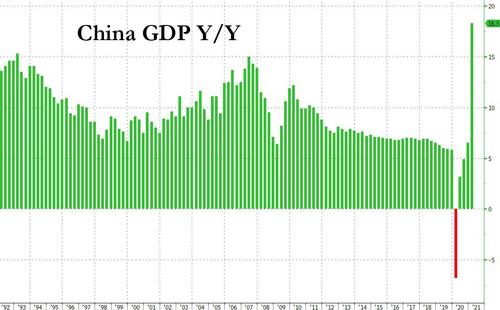
The Chinese slowdown was even more visible in the quarter-on-quarter growth which slowed to just 0.6% from 2.6% in the previous three months – the second lowest quarterly growth rate since the financial crisis with the sole exception of the covid crash quarter a year ago, while the picture in the monthly data dump was mixed at best.
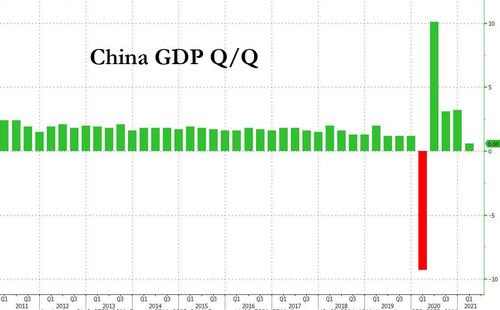
China’s expansion was supported by household consumption, which had previously lagged behind the wider recovery but is expected to play a greater role in driving growth this year. Retail sales beat expectations to add 34.2% in March, rebounding from a period of lockdowns a year earlier. Industrial production also boosted growth, with the metric adding 24.5% in the first quarter and alongside booming exports has helped prop up growth over the past year, it did, however, miss expectations in March and only rose 14.1% year-on-year. The Chinese recovery from the pandemic also helped it dominate global trade, with exports rising every month since June last year. In March, exports added 30% in dollar terms compared with the same month a year earlier.
In light of China’s recent aggressive deleveraging which has pushed China’s CSI300 just shy of dipping below the 200DMA, focus has shifted to the prospect of rate rises, with signs of overheating across parts of the economy despite persistently low consumer price inflation. The government is trying to curb leverage across its property sector, as well as rein in record rates of steel production following a construction boom. Several high-ranking officials have warned about the risks of high asset prices in recent months. Guo Shuqing, China’s top banking regulator, said in March that the country was exposed to “bubbles” in international markets and its own real estate sector.

Setting your own home on fire after using it as a garbage dump and toilet bowl. Smartest species ever.
Despite 100s of years of science and warnings, we still appear unable to understand our planet is not infinite.
• Just 3% of World’s Ecosystems Remain Intact (G.)
Just 3% of the world’s land remains ecologically intact with healthy populations of all its original animals and undisturbed habitat, a study suggests. These fragments of wilderness undamaged by human activities are mainly in parts of the Amazon and Congo tropical forests, east Siberian and northern Canadian forests and tundra, and the Sahara. Invasive alien species including cats, foxes, rabbits, goats and camels have had a major impact on native species in Australia, with the study finding no intact areas left. The researchers suggest reintroducing a small number of important species to some damaged areas, such as elephants or wolves – a move that could restore up to 20% of the world’s land to ecological intactness.
Previous analyses have identified wilderness areas based largely on satellite images and estimated that 20-40% of the Earth’s surface is little affected by humans. However, the scientists behind the new study argue that forests, savannah and tundra can appear intact from above but that, on the ground, vital species are missing. Elephants, for example, spread seeds and create important clearings in forests, while wolves can control populations of deer and elk. The new assessment combines maps of human damage to habitat with maps showing where animals have disappeared from their original ranges or are too few in number to maintain a healthy ecosystem. Some scientists said the new analysis underestimates the intact areas, because the ranges of animals centuries ago are poorly known and the new maps do not take account of the impacts of the climate crisis, which is changing the ranges of species.
It is widely accepted that the world is in a biodiversity crisis, with many wildlife populations – from lions to insects – plunging, mainly due to the destruction of habitat for farming and building. Some scientists think a sixth mass extinction of life on Earth is beginning, with serious consequences for the food, and clean water and air that humanity depends upon. “Much of what we consider as intact habitat is missing species that have been hunted [and poached] by people, or lost because of invasive species or disease,” said Dr Andrew Plumptre, the lead author of the study, from the Key Biodiversity Areas Secretariat in Cambridge, UK. “It’s fairly scary, because it shows how unique places like the Serengeti are, which actually have functioning and fully intact ecosystems. “We’re in the UN decade of ecosystem restoration now, but it is focusing on degraded habitat,” he said. “Let’s also think about restoring species so that we can try and build up these areas where we’ve got ecologically intact ecosystems.”
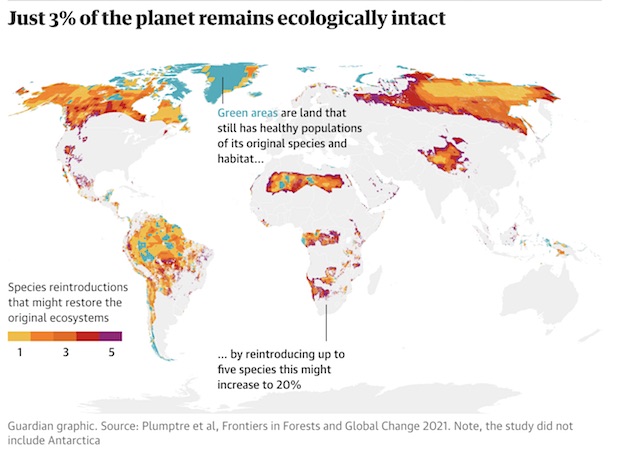

We try to run the Automatic Earth on donations. Since ad revenue has collapsed, you are now not just a reader, but an integral part of the process that builds this site. Thank you for your support.

A lady playing the piano for an elephant in a river

Support the Automatic Earth in virustime. Click at the top of the sidebars to donate with Paypal and Patreon.




